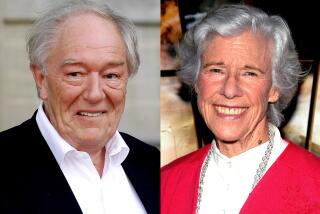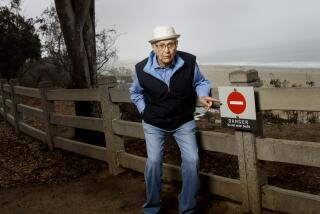Television screenwriter won Pulitzer for Broadway show
Tad Mosel, a leading writer of live television dramas in the 1950s who won a Pulitzer Prize for “All the Way Home,” his 1960 Broadway dramatization of James Agee’s novel “A Death in the Family,” has died. He was 86.
Mosel, who had cancer and lived in an assisted-living home in Concord, N.H., died Aug. 24, said director Arthur Penn, a longtime friend.
During the golden age of live television, Mosel was a major contributor of original scripts for dramatic anthology series such as “Goodyear Television Playhouse,” “Studio One” and “Playhouse 90.”
“I thought he was in the first echelon” of writers, Penn, who directed several of Mosel’s teleplays in the ‘50s, told The Times last week. “He was a very modest, shy, gay man; and he wrote with enormous sensitivity.”
Mosel was, as former Times TV critic Cecil Smith wrote in 1962, “one of the brilliant stable of playwrights developed by producer Fred Coe -- one that included Paddy Chayefsky, Bob Aurthur, Horton Foote and J.P. Miller.”
Coe had been fascinated by “A Death in the Family” -- Agee’s 1957 autobiographical novel about the effects of a father’s death in a car accident on his Tennessee family in 1915 that earned him a posthumous Pulitzer Prize in 1958 -- and commissioned Mosel to adapt it for “Playhouse 90.”
But, as The Times’ reported in 1961, “Playhouse 90” was foundering, so Coe asked CBS to release it to him for the stage.
With Penn as director, “All the Way Home” opened on Broadway at the Belasco Theatre in November 1960, with a cast that included Colleen Dewhurst, Aline MacMahon, Arthur Hill and Lillian Gish.
But the play almost closed soon after its debut.
Although most of the critics praised “All the Way Home,” Coe recalled in a 1961 interview with The Times, the Thursday opening night box office -- $340 -- was so disappointing that a closing notice was put up for the following Monday.
But on Sunday, Ed Sullivan praised the play on his national TV variety show, and on Monday the closing notices were taken down.
It would run for 333 performances, closing in September 1961.
“All the Way Home,” which was nominated for a Tony Award for best play, won the Pulitzer Prize for drama in 1961.
“Winning the Pulitzer Prize can paralyze a writer,” Mosel told The Times in 1962. “The only answer is to make believe you never heard of it and plunge back into your work.”
For Mosel, that meant television, beginning with writing a 1962 teleplay for CBS, “That’s Where the Town’s Going,” about two small-town spinster sisters whose way of life is interrupted when a childhood friend returns. The cast included Jason Robards, Kim Stanley, Patricia Neal and Buddy Ebsen.
Mosel’s writing, as The Times’ Smith observed at the time, was “admiringly suited to the intimacy of TV’s live ‘closet’ drama. Almost all of his plays are concerned with family relationships.”
Of the time he wrote for live television, Mosel told the Washington Post in 1981: “You will never hear me say it wasn’t a golden era. It was as golden as golden can be -- not a zenith, but a flowering period. . . . It offered tremendous opportunity to young talent.”
Mosel also wrote the screenplays for the 1964 film comedy “Dear Heart,” starring Glenn Ford and Geraldine Page; and the 1967 movie drama “Up the Down Staircase,” starring Sandy Dennis.
In 1977, he received an Emmy nomination for outstanding writing in a drama series for an episode of “The Adams Chronicles” on PBS.
He was born George Ault Mosel Jr. in Steubenville, Ohio, on May 1, 1922, and nicknamed Tad by his father, a wholesale grocer.
The family moved to New Rochelle, N.Y., after the business went bankrupt in the wake of the 1929 stock market crash.
Mosel attended Amherst College before joining the Army during World War II and serving as a weather observer in the South Pacific.
He returned to Amherst after the war and earned a bachelor’s degree in 1947. He also attended the Yale School of Drama and earned a master’s degree from Columbia University in 1953.
Mosel played the scene-stealing, nonspeaking role of “a lost private” in the Broadway farce “At War With the Army,” which ran for several months in 1949, the same year his first teleplay was produced.
Mosel also co-wrote, with Gertrude Macy, the 1978 biography “Leading Lady: The World and Theatre of Katharine Cornell.”
“I fell in love with the theater when I was 14 and saw Katharine Cornell in ‘St. Joan,’ ” he recalled in a 1981 interview with the Associated Press. “Thirty years later, when somebody asked me to write her biography, I felt I was paying my debt.”
Mosel had no immediate surviving family members.
--
More to Read
The biggest entertainment stories
Get our big stories about Hollywood, film, television, music, arts, culture and more right in your inbox as soon as they publish.
You may occasionally receive promotional content from the Los Angeles Times.










